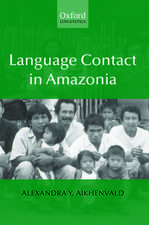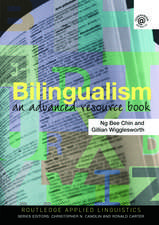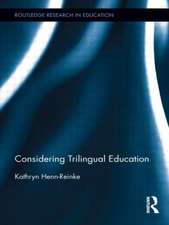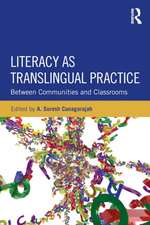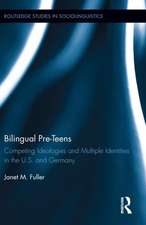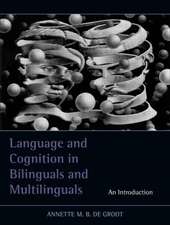Linguistic Genocide in Education--or Worldwide Diversity and Human Rights?
Autor Tove Skutnabb-Kangasen Limba Engleză Paperback – 2000
A Web site with additional resource materials to this book can be found at http://www.ruc.dk/~tovesk/
Preț: 859.79 lei
Preț vechi: 1048.53 lei
-18% Nou
Puncte Express: 1290
Preț estimativ în valută:
164.52€ • 172.23$ • 136.13£
164.52€ • 172.23$ • 136.13£
Carte tipărită la comandă
Livrare economică 05-19 aprilie
Preluare comenzi: 021 569.72.76
Specificații
ISBN-13: 9780805834680
ISBN-10: 0805834680
Pagini: 820
Dimensiuni: 152 x 229 x 46 mm
Greutate: 1.11 kg
Ediția:New.
Editura: Taylor & Francis
Colecția Routledge
Locul publicării:Oxford, United Kingdom
ISBN-10: 0805834680
Pagini: 820
Dimensiuni: 152 x 229 x 46 mm
Greutate: 1.11 kg
Ediția:New.
Editura: Taylor & Francis
Colecția Routledge
Locul publicării:Oxford, United Kingdom
Public țintă
ProfessionalCuprins
Contents: Preface. Introduction. Part I: Setting the Scene. What Is Happening to the Languages of the World. Connections Between Biodiversity and Linguistic and Cultural Diversity. Mother Tongue(s), Culture, Ethnicity, and Self-Determination. Linguistic Diversity--Curse or Blessing? To Be Maintained or Not? Why? Part II: Linguistic Genocide, State Policies, and Globalisation. State Policies Towards Languages--Linguistic Genocide, Language Death, or Support for Languages? Globalisation, Power, and Control. Part III: Struggle Against Linguistic Genocide and for Linguistic Human Rights in Education. Linguistic Human Rights. Linguistic Human Rights in Education? Alternatives to Genocide and Dystopia.
Recenzii
"Language related documentalists will find this an invaluable, relevant source, given the author's keen sense of informativity....Written by the world's most active, committed, dedicated and knowledgeable scholar in the new domain of human linguistic rights...this very thought- and action-provoking book will be of interest and inspiration to all those who share Skutnabb-Kangas' conviction that 'more overt political action' is needed by 'the same people who do the persuading' in favour of diversity and human rights. In short, a 'must' for all humanists and humanisers interested in linguistic rights, cultural rights, and related issues."
—SIGNPOST
"...this magnum opus provides a synthesis of Tove Skutnabb-Kangas' three decades of writing, but also in itself has new and provocative ideas. Who else in the world could so successfully combine language theory and research with human rights, biodiversity, language ecology, linguistic imperialism, bilingual and multilingual education, anti-racism, cultural diversity, ethnicity, and politics? The book is unique....
the book is a tour de force, an encyclopedic consideration of minority languages, well informed, geographically and intellectually global in understanding. Few scholars produce works of such substance and scope. The book is not presented in standard academic prose. It is passionate and vigorous, sometimes emotive and polemic. This is a tome of commitment. It advocates and affirms with intensity and ardour. This is not a gentle and neutral text but an agitated uncovering of inequity and injustice. It is uncomfortable and provocative such that it threatens warm and well-accepted wisdom."
—Journal of Sociolinguistics
"It challenges common assumptions and misconceptions and then goes on to suggest how education and linguistic and human rights can be combined without being threatening to the majority....is a mine of information and a must for anyone with an interest in education and human rights."
—Newsletter of Foundation for Endangered Languages
"The book is a mine of information and a must for anyone with an interest in education and human rights".
—Newsletter of Foundation for Endangered Languages
"Skutnabb-Kangas' 667 pages of running text and 70 pages of references in defence of global language diversity is impressive and worth the effort. The volume is a source-book for scholars in the field of sociolinguistics, particularly language policy and language planning, the sociology of education, critical pedagogy, comparative education and minority studies, cultural studies, ethnolinguistics and ecological issues. This is a do-it-yourself manual that I can actually understand without having to read it upside-down."
—Current Issues in Language Planning
"It is a politically ambitious book about inequality, in which language policies are analysed in the context of world wide power relations. This book is a call for action, because it demands change. It is a voluminous book of almost 800 pages, based upon some decades of the author's own research as well as on results from research across various academic disciplines...Even though she at times attacks teaching traditions furiously and names their fallacies, Skuttnabb-Kangas has not written a pessimistic book. It is her concern to call attention to alternatives in minority and dominated-group education... The book shows a clear commitment and there is no doubt that Skutnabb-Kangas's general cause should be supported."
—European Educational Research Journal
"Now and then a book is published that stands out above the rest because its contribution is both important and unique. We know that it is a text that we will return to again and again-it will live with us. Skutnabb-Kangas' new book, Linguistic Genocide in Education, is such a book; it is an intellectual tour de force^; it interests, fascinates, disturbs, and challenges us on many different levels. It combines rich description with in-depth analysis examining sociolinguistic, sociocultural, and political issues from different perspectives without losing sight of the main thesis of the book. This intricately woven tapestry, unravelled for and by the reader, offers multi-faceted and multi-levelled accounts; it represents a great intellect at its peak."
—Multilingual Matters LTD
"This work, by one of the leading scholars of linguistic human rights, presents a provocative, engaging, grand synthesis. It makes a major contribution by bringing together a number of contemporary theoretical and research orientations as evidenced by its focus on linguistic human rights, linguistic ecology, and the impact of linguistic imperialism. In addition, it provides basic insights on anti-racist education....This is a book that deserves reading by students and scholars committed to furthering educational equity and human rights. Both specialists and those new to the field will find it challenging and informative. It is the type of book that forces educators and students to reflect on their own assumptions and values."
—Terrence G. Wiley
Arizona State University
"A pathbreaking text, written with absolute clarity of purpose and commitment....The book as a whole takes the debates about minority languages much further than ever before....It is a fascinating and immediate social history of languages, political forces, struggles, and education....[Although] this is a lengthy work, and one which may appear to be daunting at the outset....what one discovers is an engaging and varied style which teases the reader further and further into a domain which has never before been captured from so many and new angles....It is a privilege and a pleasure to read a work of such international significance."
—Kathleen Heugh
Project for the Study of Alternative Education in South Africa, University of Ca
"An absolutely stirring 'J'accuse', appealing to the conscience of the Western world to cease the ethnolinguistic genocide which it has inflicted on humanity at large. Via a superb and compelling assembly of data, logic, argument, and analysis, Skutnabb-Kangas shows how justice, decency, health, social stability, and normal biodiversity all suffer, even in the West itself, when linguacidal state and global policies are implemented. Nothing less than an international campaign for linguistic human rights is called for and called for with compelling force and convincing clarity."
—Joshua Fishman
University Research Professor of Social Sciences, Yeshiva University
"A substantial, important, and creative contribution....Skutnabb-Kangas is a very gifted and respected scholar, and her past work has been seminal in the field. This book not only brings together a number of the themes and topics on which she has worked in the past, but moves forward in a substantial manner the debate about language policy in education broadly conceived....It represents Skutnabb-Kangas at her very best, and will challenge other researchers, teachers, and policymakers to more honestly and thoughtfully address language-related issues in education."
—Timothy Reagan
University of Connecticut
—SIGNPOST
"...this magnum opus provides a synthesis of Tove Skutnabb-Kangas' three decades of writing, but also in itself has new and provocative ideas. Who else in the world could so successfully combine language theory and research with human rights, biodiversity, language ecology, linguistic imperialism, bilingual and multilingual education, anti-racism, cultural diversity, ethnicity, and politics? The book is unique....
the book is a tour de force, an encyclopedic consideration of minority languages, well informed, geographically and intellectually global in understanding. Few scholars produce works of such substance and scope. The book is not presented in standard academic prose. It is passionate and vigorous, sometimes emotive and polemic. This is a tome of commitment. It advocates and affirms with intensity and ardour. This is not a gentle and neutral text but an agitated uncovering of inequity and injustice. It is uncomfortable and provocative such that it threatens warm and well-accepted wisdom."
—Journal of Sociolinguistics
"It challenges common assumptions and misconceptions and then goes on to suggest how education and linguistic and human rights can be combined without being threatening to the majority....is a mine of information and a must for anyone with an interest in education and human rights."
—Newsletter of Foundation for Endangered Languages
"The book is a mine of information and a must for anyone with an interest in education and human rights".
—Newsletter of Foundation for Endangered Languages
"Skutnabb-Kangas' 667 pages of running text and 70 pages of references in defence of global language diversity is impressive and worth the effort. The volume is a source-book for scholars in the field of sociolinguistics, particularly language policy and language planning, the sociology of education, critical pedagogy, comparative education and minority studies, cultural studies, ethnolinguistics and ecological issues. This is a do-it-yourself manual that I can actually understand without having to read it upside-down."
—Current Issues in Language Planning
"It is a politically ambitious book about inequality, in which language policies are analysed in the context of world wide power relations. This book is a call for action, because it demands change. It is a voluminous book of almost 800 pages, based upon some decades of the author's own research as well as on results from research across various academic disciplines...Even though she at times attacks teaching traditions furiously and names their fallacies, Skuttnabb-Kangas has not written a pessimistic book. It is her concern to call attention to alternatives in minority and dominated-group education... The book shows a clear commitment and there is no doubt that Skutnabb-Kangas's general cause should be supported."
—European Educational Research Journal
"Now and then a book is published that stands out above the rest because its contribution is both important and unique. We know that it is a text that we will return to again and again-it will live with us. Skutnabb-Kangas' new book, Linguistic Genocide in Education, is such a book; it is an intellectual tour de force^; it interests, fascinates, disturbs, and challenges us on many different levels. It combines rich description with in-depth analysis examining sociolinguistic, sociocultural, and political issues from different perspectives without losing sight of the main thesis of the book. This intricately woven tapestry, unravelled for and by the reader, offers multi-faceted and multi-levelled accounts; it represents a great intellect at its peak."
—Multilingual Matters LTD
"This work, by one of the leading scholars of linguistic human rights, presents a provocative, engaging, grand synthesis. It makes a major contribution by bringing together a number of contemporary theoretical and research orientations as evidenced by its focus on linguistic human rights, linguistic ecology, and the impact of linguistic imperialism. In addition, it provides basic insights on anti-racist education....This is a book that deserves reading by students and scholars committed to furthering educational equity and human rights. Both specialists and those new to the field will find it challenging and informative. It is the type of book that forces educators and students to reflect on their own assumptions and values."
—Terrence G. Wiley
Arizona State University
"A pathbreaking text, written with absolute clarity of purpose and commitment....The book as a whole takes the debates about minority languages much further than ever before....It is a fascinating and immediate social history of languages, political forces, struggles, and education....[Although] this is a lengthy work, and one which may appear to be daunting at the outset....what one discovers is an engaging and varied style which teases the reader further and further into a domain which has never before been captured from so many and new angles....It is a privilege and a pleasure to read a work of such international significance."
—Kathleen Heugh
Project for the Study of Alternative Education in South Africa, University of Ca
"An absolutely stirring 'J'accuse', appealing to the conscience of the Western world to cease the ethnolinguistic genocide which it has inflicted on humanity at large. Via a superb and compelling assembly of data, logic, argument, and analysis, Skutnabb-Kangas shows how justice, decency, health, social stability, and normal biodiversity all suffer, even in the West itself, when linguacidal state and global policies are implemented. Nothing less than an international campaign for linguistic human rights is called for and called for with compelling force and convincing clarity."
—Joshua Fishman
University Research Professor of Social Sciences, Yeshiva University
"A substantial, important, and creative contribution....Skutnabb-Kangas is a very gifted and respected scholar, and her past work has been seminal in the field. This book not only brings together a number of the themes and topics on which she has worked in the past, but moves forward in a substantial manner the debate about language policy in education broadly conceived....It represents Skutnabb-Kangas at her very best, and will challenge other researchers, teachers, and policymakers to more honestly and thoughtfully address language-related issues in education."
—Timothy Reagan
University of Connecticut
Descriere
Documents & analyzes the destruction of native languages & cultures that is taking place today & proposes alternative models & practices. A multi-disciplinary work drawing on education, applied language studies, sociology, psychology, & human rights.

